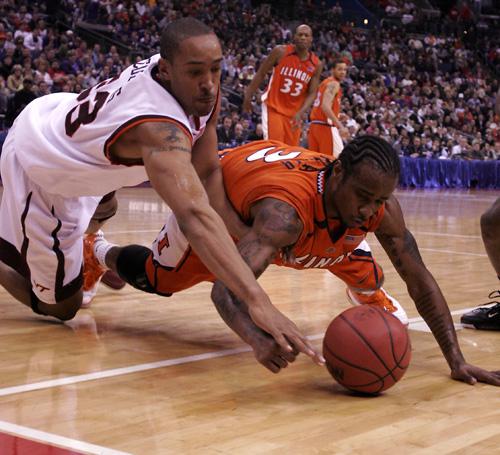After tumultuous season, Illini drop heartbreaker to Hokies

Mar 26, 2007
For 32 minutes, they were the aggressor, playing with the courage head coach Bruce Weber believed to be their most defining attribute.
They refused to give in to a Virginia Tech team that boasted All-ACC guards and the ACC Defensive Player of the Year, beaten the likes of Maryland, Georgia Tech and North Carolina and had four starters averaging double figures in scoring.
Then, just as quickly as some of the hardships the Illini faced this season came upon them, their 13-point lead disappeared, which resulted in a 54-52 loss in the first round of the NCAA Tournament on March 16 at Nationwide Arena in Columbus, Ohio.
By the time the Hokies went to their full-court press, the Illini were just hoping that their lead would hold.
Nerves got the best of them, said senior Warren Carter, who had 15 points and five rebounds in his last game for the Illini (23-12).
Get The Daily Illini in your inbox!
“They started pressuring us some more in the half court, but most of our turnovers were after we broke the press. They never really had turnovers from the full-court press – it was just us being careless with the ball,” Carter said. “Our mentality switched from being the aggressor to letting the clock tick out to try to get the win.”
Instead of the clock ticking down with Illinois as the victor, it found itself on the other side of the column, as it committed 21 turnovers and failed to score in the final four minutes and twenty-seven seconds.
After surging to a 29-21 halftime advantage, the Illini managed just seven field goals and finished the game 8-of-15 from the free-throw line.
“We just gave it up; I don’t know if that’s typical or not,” said Brian Randle of Illinois’ inability to protect its second-half leads. “We feel like we should have won; we had our opportunities. I had my opportunity to win the game for these guys, and just blew it.”
Randle, who had seven points and 12 rebounds, was referring to his missed three-pointer with seven seconds remaining and Illinois trailing 54-52.
The junior forward then missed the front end of a 1-and-1 at the foul line with four seconds to go. As much as Randle wanted to take the blame for the Illini’s first-round exit, it was a team effort.
The Illini scored just eight points in the final 10:46. Weber did, however, credit Illinois’ ability to battle to the last play – an offensive rebound by Randle, which resulted in a loose ball.
Virginia Tech center Coleman Collins, who had 13 points, called the play, “a sign of what the entire game was,” in that “they gave us their best effort and we put our best effort out there and it was a fight.”
“I think we showed we belonged in the tournament, but it’s just this group, it’s kind of typical of the year – losing the lead, balls not bouncing, calls not going your way down the stretch,” Weber said of the disappointing result.
“This year it was difficult and they could have quit, they could have rolled over and just let the season run over them, let life run over them, and they didn’t,” Weber added.
In Weber’s eyes, the loss shouldn’t take away from the Illini’s 23-win season and the adversity they overcame.
He credits the squad that became coachable and bought into the system of what they were as a team, along with its ability to find ways to win games – ones in which they were often times just two players deep on the bench because of the string of injuries that plagued them throughout.
“All of them played with a lot of courage, a lot of heart,” Weber said. “Maybe it was not a year of beauty, but (it was) a year of heart and grinding it out and battling and not giving up.”
Virginia Tech coach Seth Greenberg said Illinois might have been the best defensive team it faced all season because of the Hokies inability to penetrate.
But for Carter and the rest of the Illini, it was about what could have been after experiencing jubilation on Selection Sunday when they made their eighth consecutive NCAA Tournament.
“It was definitely great, but we could have done more and that’s what’s tough,” Carter said.
“As a competitor you always want to do as much as you can,” he added.





